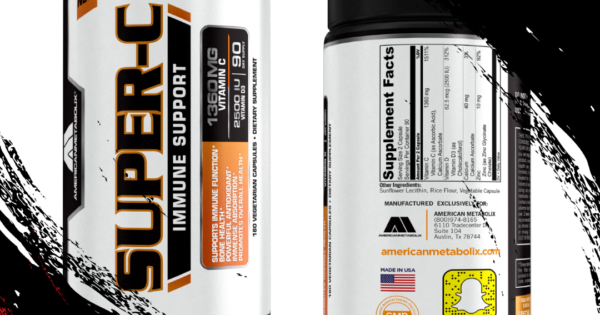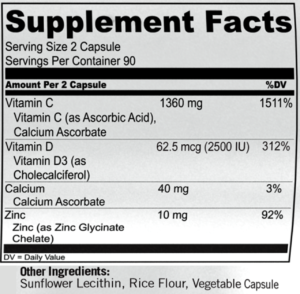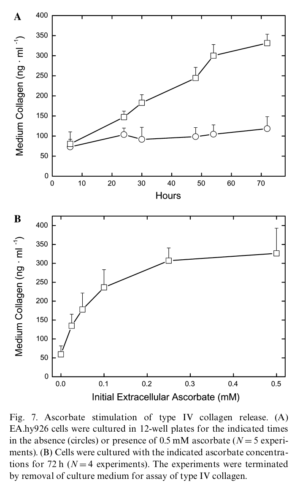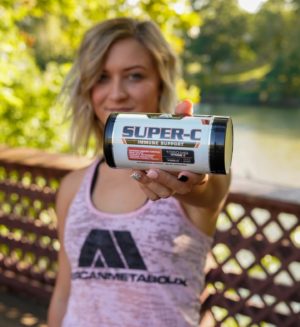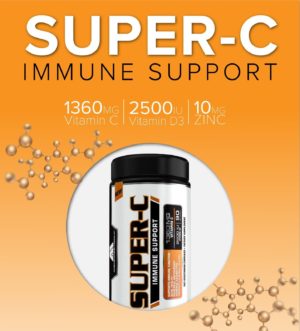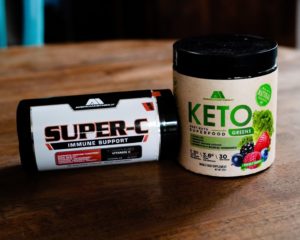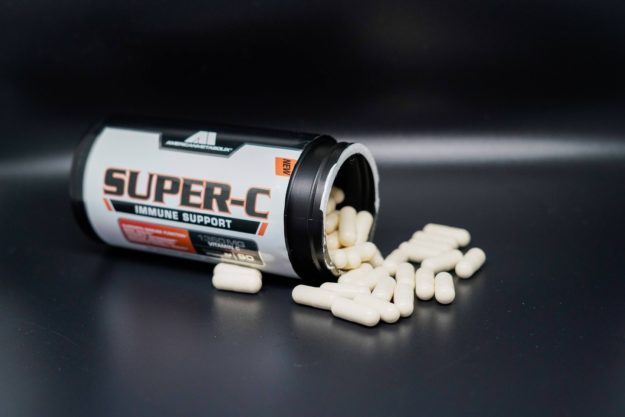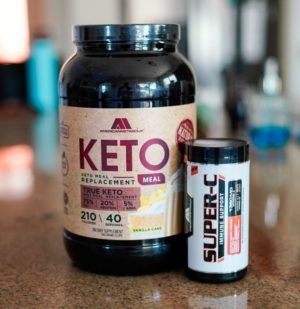With everything going on in the world today, it’s understandable that you might want to take something to support your immune system.
There are so many nutritional supplements on the market that claim to improve immune function, and many of them have gotten so obscure that most of us have never heard of them. How can we really verify the claim that some herb from halfway around the world with not even a dozen studies supporting its use will help us avoid getting sick?
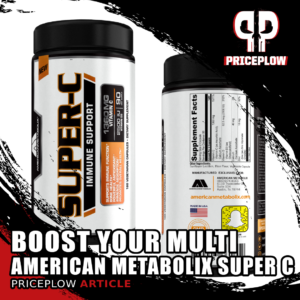
Looking to mega-dose Vitamin C? Not enough C, D, or Zinc in your multi? Then we’ve got a simple but powerful supplement here for you in American Metabolix Super C
For the consumer who’s new to this industry, the problem is especially acute. Where should a supplement beginner start?
Enter Super C from the diet experts at American Metabolix.
The Super C stack is formulated from a handful of generic ingredients that almost everyone has heard of. Everything inside has been studied extensively, is relatively inexpensive, and most importantly, has a great safety profile.
And, of course, each ingredient has one big benefit in common: they all boost immunity.
After covering a bunch of “novel” immune supplements, we had a few readers ask for something slightly more mainstream. Super C is just that supplement — something to improve your multivitamin’s gaps — so we cover it below:
In a single two capsule serving of Super C from American Metabolix, you get the following:
Vitamin C (as Ascorbic Acid, Calcium Ascorbate) – 1360 mg (1511% DV)
As might be expected from the name, Super C packs a whopping dose of vitamin C, a water-soluble vitamin with a multitude of functions in the body. Vitamin C is so powerful, and so wide-ranging in its effects, that Nobel laureate Linus Pauling, who won the 1954 prize in chemistry, was famously obsessed with its structure and potential uses. Although modern researchers generally agree that Pauling’s optimism about vitamin C was somewhat excessive, it’s a testament to the power of vitamin C that such a brilliant mind could be so captivated by it.
Vitamin C and Immunity
A research review from the journal Nutrients concluded that “supplementation with vitamin C appears to be able to prevent and treat respiratory and systemic infections.”[1] So if you feel yourself getting sick, reaching for the vitamin C is not a bad idea, and this is why vitamin C supplements have long dominated the market for over-the-counter cold and flu treatments.
But even once you get sick, and it’s too late to prevent illness, taking some extra vitamin C is probably not a bad idea. The reason is that many infections and illnesses significantly reduce your body’s levels of vitamin C, due to the increased metabolic requirements demanded by illness. In these cases, it may help to consume more than the daily recommended serving of vitamin C.[1]
Vitamin C’s Mechanism of Action: Antioxidant Effects
Vitamin C is probably best known as an antioxidant,[1] which is defined as any substance that can prevent the chemical process of oxidation from taking place.[2] In the human body, oxidative stress caused by the proliferation of “free radicals” reliably causes cellular damage, so antioxidants basically prevent cellular damage.
Vitamin C is also a cofactor for crucial genes and enzymes,[1] is required for optimal immunity,[1] and also regulates the function of the adrenal glands,[3] which have the highest concentration of vitamin C to be found anywhere in the body.[3]
Vitamin C and the Adrenal Glands
Because vitamin C is crucial for catecholamine synthesis,[3] low levels of vitamin C have been implicated in “adrenal insufficiency”[4] as well as a variety of stress-related illnesses, some of which are quite serious.[5] While adrenal-related conditions are often controversial, many believe that these glands tend to “burn out” due to overuse, and we believe the research has at least some merits that vitamin C may assist with.[4]
Reason being, the research literature shows that vitamin C can directly alleviate the body’s stress response,[6] and it has been shown to reverse the action of an anesthetic that impairs adrenal function.[7]
Basically, you can think of vitamin C as an adrenal tonic – almost like an adaptogen. It can potentially help restore proper adrenal function, whether the adrenals are underactive or overactive.
Vitamin C also:
- Increases collagen synthesis[8,9]
- Supports neurotransmitter production[10]
- Facilitates inter-neuronal communication[11]
- Lowers blood pressure[12]
- Reduces risk of coronary heart disease[13]
- Fortifies the epithelium (keeping pathogens out of the body)[1]
- Increases the activity of phagocytes, which directly attack pathogens[1]
- Is required for apoptosis and autophagy[1]
- Increases the production of lymphocytes,[1] a type of immune cell
With such a high dose of vitamin C, we get to cover some other fun topics:
Vitamin C and Male Fertility
In mammals, vitamin C deficiencies have been repeatedly linked to compromised testicular function,[14] and in animals who are subjected to severe stress, vitamin C supplementation has been shown to protect testicular tissue from stress-induced damage.[15]
The effect has been replicated consistently with infertile human males whose sperm quality improved significantly following the administration of vitamin C.[16]
Although research on the effects of vitamin C in fertile men is scant, from the evidence that exists, it seems clear that vitamin C protects testicular structure and function from many different types of insult, so it could potentially be a good way to preserve your fertility and testosterone production.
If you have varicocele (a common condition afflicting up to 15% of men), vitamin C supplementation can potentially relieve the increased oxidative burden on your testicular tissue that is caused by this condition.
Vitamin C’s relevance to contemporary viruses
When it comes to recent viral outbreaks, vitamin C shows promise in treating symptoms and is generally regarded as safe,[17] so we don’t see a reason to not take it as part of a pro-immunity supplement stack. It should be noted, though, that most of this research examined intravenous administration,[18] so it might not necessarily apply to oral forms of vitamin C, or oral use may have lower efficacy in comparison to those intravenous interventions.
Vitamin D3 (as cholecalciferol) – 62.5 mg/2500 IU (312% DV)
Just like vitamin C, vitamin D is a powerful compound with a wide range of effects in the human body.
The first thing to note here is that American Metabolix has opted for the cholecalciferol form of vitamin D, which is generally recognized to be the most bioavailable and biologically active – it is the very same form of D that is produced by our skin when exposed to direct sunlight.[19]
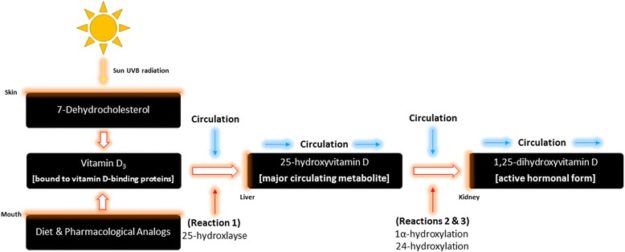
Supplemental Vitamin D helps your body generate the active hormonal form just like your skin is able to do with sunshine!
Vitamin D and Testosterone
Optimal vitamin D blood levels come with a stunning array of hormonal benefits, from aromatase inhibition[20] to increased testosterone production,[21,22] both of which will increase the overall androgenic activity in your body. Generally speaking, there is a clear positive correlation between vitamin D and testosterone – the more D, the more testosterone.[21]
In a 2011 double-blind, randomized, placebo-controlled study, men who were given 3332 IU of vitamin D daily showed a 25% increase in total testosterone and a 20% increase in free testosterone compared to placebo.[22]
So if your goals include building muscle and maximizing your athletic performance, vitamin D is a supplement you definitely do not want to sleep on.
Vitamin D and Immunity
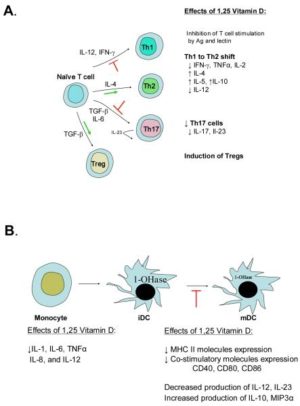
Vitamin D’s effects on T cells (top) and inhibition of inflammatory cytokine production (bottom)[23]
In 2011, the Journal of Investigative Medicine published a research review that concluded vitamin D deficiency has a significant negative impact on immune function.[23] This is mainly because most immune cells contain the vitamin D receptor, including T-cells, B-cells, monocytes, and antigen-presenting cells. This means that vitamin D is involved in innate and adaptive immune responses alike.[23,24]
But interestingly, vitamin D has also been identified as a tolerogen, meaning that it can suppress an unnecessary immune response that really isn’t appropriate, sparing the body of taxing and potentially damaging effort.[23,24] This is important because indiscriminate immune responses are the basis of autoimmune disorders, and have been linked to chronic inflammation,[25] which can cause many devastating and potentially fatal illnesses if left unchecked.[26]
Vitamin D and Skin Health
Evidence from animal models and in vitro studies suggests that vitamin D has “photoprotective” effects, meaning that it prevents ultraviolet light exposure from damaging the skin.[27] That’s significant, because all of us get tons of UV exposure from sunlight, and UV exposure is considered to be a risk factor of skin cancer.[28]
And when you think about why this might be the case, it makes perfect sense – our skin produces vitamin D in response to sunlight. One reason for that is probably to protect our skin from damage during brighter, hotter months.
Vitamin D also prompts wound healing: in cultured skin cells, it has been shown to increase levels of cathelicidin, a protein that improves “re-epithelialization”, which is the process of restoring the epidermis layer of the skin that is your body’s first line of defense against pathogens and other environmental contaminants.[29]
Relevance to contemporary viral outbreaks
It’s generally accepted that low vitamin D levels raise the risk of complications from a wide variety of viral diseases, as this has been consistently shown in research studies and meta-analysis.[30-33]
If you want to maximize your chances of a speedy recovery from viral infections, don’t let your vitamin D levels drop. If you aren’t getting enough direct sun exposure, consider supplementing with vitamin D3 and avoiding activities and drugs that reduce vitamin D levels.
A word about vitamin D dosing
A little more care needs to be taken when we dose vitamin D, because unlike vitamin C, which is water-soluble, vitamin D is fat soluble and can accumulate in the body over long periods of time, eventually producing symptoms of vitamin D toxicity.
Fortunately, the dose used by American Metabolix is well under the tolerable upper limit (TUL) of 4,000 IU per day,[34] but it’s important to note that the TUL is calculated by adding up all sources of vitamin D intake – so if you want to be on the safe side, you need to ensure that while you’re taking this supplement, you get no more than 1,500 IU of vitamin D from other supplements.
According to the 2005-2016 National Health and Nutrition Examination Survey (NHANES), 95% of Americans who don’t take vitamin D supplements are below the estimated average requirement (EAR) intake of 400 IU per day,[35] meaning that if you aren’t taking another vitamin D-containing supplement, it’s very unlikely that Super C from American Metabolix will put you at risk of vitamin D overdose. And quite frankly, multivitamins usually don’t have enough of this critical vitamin, so we’re big fans of this dose.
Zinc (as Zinc Glycinate Chelate) – 10 mg (92% DV)
Often called the “master mineral of the male endocrine system”, optimal zinc levels are absolutely essential for optimal health.
Zinc and Immunity
It’s generally accepted in the research literature that supplementing with zinc at high enough doses can significantly reduce symptoms of the common cold.[36-46] Because of this, most major supplement companies have put out zinc-based immunity products in the past two years, and this was probably a good business strategy since there’s a strong correlation between optimal zinc levels and recovering successfully from novel viruses.[47-49] This is true whether zinc is used in early[50,51] or late treatment.[52,53]
Zinc and Mood
Zinc has repeatedly been shown to improve mood in both men and women.[54-58] The studies on this topic are generally long-lasting, use large sample sizes, and have almost universally positive outcomes. One of these studies also showed a reduction in anxiety levels.[58]
Zinc and Testosterone
Zinc supplementation has been repeatedly shown to raise testosterone levels. Interestingly, this effect occurs in both sedentary and athletic subjects.[59-62] In some of these studies, increases in free testosterone were also observed,[59,62] something worth noting since free testosterone is the biologically active form of the hormone.
Zinc and Glucose Metabolism
People who supplement with zinc generally show lower blood glucose levels[63-65] and better insulin sensitivity[64,65] than controls. This effect is especially pronounced in obese subjects. In the adolescent subpopulation, correcting a zinc deficiency tends to produce fat loss.[66]
A Note about Satiety
Why would correcting a zinc deficiency lead to fat loss? The short answer is that there are multiple inputs to the feeling of satiety. Since hunger is partly your body’s response to micronutrient shortfalls, a single micronutrient deficiency can lead to instinctive overeating as your body tries to correct the deficiency by increasing its food intake.
For this reason, eating nutrient-dense foods will increase satiety, whereas nutrient-poor foods will more frequently lead to obesity. Supplementation can also help with this.
Zinc and Acne
There’s a small body of research that suggests high doses of zinc (~50 mg) may improve acne symptoms.[67-69] Limited success has been observed with lower doses (30 mg) as well.[70]
Zinc and Cognition
Zinc supplementation has produced cognitive improvements in subjects of all ages.[71,72]
Zinc and Other Health Markers
A lot of other indicators of good health seem to attend zinc supplementation. Some of these include higher IGF-1 levels,[73-75] lower fasting insulin levels,[64,65,76,77] lower C-reactive protein (CRP) levels, which indicates lower levels of inflammation,[64,76,78-80] improved antioxidant activity,[81] and higher levels of thyroid hormones T3 and T4.[59,62]
What is Zinc Glycinate Chelate?
The glycinate chelate form of zinc is a zinc molecule bound to the amino acid glycine. The reason to bind zinc like this is because our digestive tract is not very good at absorbing pure minerals. However, it’s excellent at absorbing protein and amino acids. Thus, by binding zinc to glycine, the amount of absorption through the intestinal wall is increased, leading to higher bioavailability.[82] Once it enters the bloodstream, the zinc can be cleaved from the glycine molecule and metabolized according to the body’s needs.
Other ingredients – Calcium – 40 mg (3% DV)
There is a small amount of calcium bound to both the vitamin C (calcium ascorbate) and the vitamin D (cholecalciferol) in this product, so it’s labeled in there. This obviously isn’t a calcium supplement, but 40 milligrams is better than 0 milligrams – only 97% more to go to get your daily recommended value!
Super C from American Metabolix is an awesome stack for somebody who’s just getting started with nutritional supplementation and wants some heavy-hitter ingredients with proven benefits – low-hanging fruit, if you will. The two-capsule serving size makes taking this supplement super convenient, and every ingredient is provided in the most bioavailable and efficacious form available.
One of the big things that all three ingredients in this product have in common is an immunity-boosting effect, so if you’re looking to avoid getting sick, this is a supplement you should consider taking.
We have more interesting research coming with respect to American Metabolix supplements and ingredients, so stay tuned to PricePlow to learn more below:
Source link

